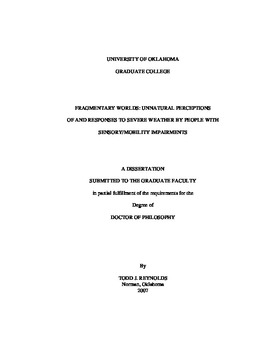| dc.contributor.advisor | Nostrand, Richard, | en_US |
| dc.contributor.advisor | Shelley, Fred, | en_US |
| dc.contributor.author | Reynolds, Todd J. | en_US |
| dc.date.accessioned | 2013-08-16T12:20:57Z | |
| dc.date.available | 2013-08-16T12:20:57Z | |
| dc.date.issued | 2007 | en_US |
| dc.identifier.uri | https://hdl.handle.net/11244/1282 | |
| dc.description.abstract | This study is the first to investigate how people with disabilities perceive and respond to severe weather alerts. Their unfortunate experiences, underscored by the Indian Ocean monster tsunami in 2004 and hurricane Katrina in 2005 reinforced the need to further understand the manner in which people with sensory/physical impairments perceive and respond to severe weather warnings. In this dissertation I argue that people with sensory/physical impairments often demonstrate an unnatural quality to 'natural' hazards in their approach and behavior to severe weather. In order to achieve this objective I use a methodology first developed and implemented by Zimmerman and Wieder (1977), the Diary: Diary-Interview Method, to examine these unnatural personal experiences of 5 research subjects with diverse sensory and physical impairments, between the ages of 24 and 60, during the Spring and Summer months of 2005 and 2006. These experiences are then compared to the experiences of a able-bodied control group. Analysis of the data reveals that a lack of social capital suggests an unnatural hazards component when severe weather events threaten. However, participants with access to social capital exhibit a commonalty with able-bodied participants and demonstrate natural circumstances when dealing with severe weather events. Following this evidence, I conclude from the results of the research that social capital is a necessity for people with sensory and/or physical impairments, and this evidence should be accounted for when considering the theory of unnatural hazards. | en_US |
| dc.description.abstract | Key words: people with sensory/physical disabilities, natural/unnatural hazards, personal experiences. | en_US |
| dc.format.extent | viii, 133 leaves ; | en_US |
| dc.subject | People with disabilities. | en_US |
| dc.subject | Geography. | en_US |
| dc.subject | Natural disaster warning systems. | en_US |
| dc.subject | Severe storms. | en_US |
| dc.title | Fragmentary worlds: Unnatural perceptions of and responses to severe weather by people with sensory/mobility impairments. | en_US |
| dc.type | Thesis | en_US |
| dc.thesis.degree | Ph.D. | en_US |
| dc.thesis.degreeDiscipline | Department of Geography and Environmental Sustainability | en_US |
| dc.note | Source: Dissertation Abstracts International, Volume: 68-12, Section: A, page: 5171. | en_US |
| dc.note | Advisers: Fred Shelley; Richard Nostrand. | en_US |
| ou.identifier | (UMI)AAI3291241 | en_US |
| ou.group | College of Atmospheric & Geographic Sciences::Department of Geography and Environmental Sustainability | |
